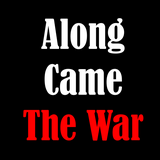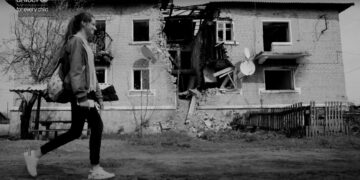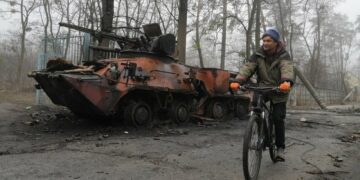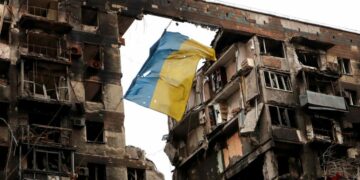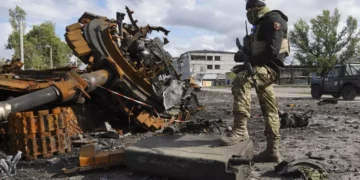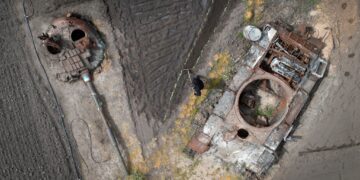Maria Borshchenko recounts the terrifying first moments of Russia’s full-scale invasion in February 2022 and the process of adapting to constant air raid sirens, while Martha Shvets explores the cultural disconnect she experienced as a refugee in Germany when confronted with historical trauma at Dachau while actively processing her own wartime experiences.
THE FIRST DAY OF WAR, WHEN EVERYTHING CHANGED FOREVER
By Maria Borshchenko
For every Ukrainian, the morning of February 24, 2022, began with fear and uncertainty. Personally, I live in a relatively safe region, so I wasn’t woken up by the sounds of explosions or air raid sirens. Instead, my mother woke me up and said words that I will never forget: “Masha, the war has started.” At first, I couldn’t comprehend what was happening. That day, I had a test scheduled at school, and out of habit, I asked my mother if I should still go. She looked at me and said, “Of course not. There is a war now.” Those words sent a wave of anxiety through me. With trembling hands, I grabbed my phone and started reading the news. My body reacted to the stress—my hands turned ice-cold, and I began shaking uncontrollably. We turned on the TV, and as we watched the unfolding events in fear, the reality of war became undeniable. The president’s address that morning is something I will remember forever—it was the moment I realized that life, as we knew it, had changed forever.
That day, I felt a lot of fear for my life and deep pain for my country. When I read the news, I started crying because I felt helpless and didn’t know what would happen to us. I remember how we sat down for lunch, and my younger sister looked at us with confusion. She could see that we were very worried and kept asking what was going on. I had to say the terrible words: “There is a war now.” It was one of the hardest things I have ever said.
Later, I felt even more scared when I heard the air raid siren for the first time. I knew that a missile was flying, and there was nothing I could do to stop it. Even good shelters don’t always protect people, but the worst thing was that we didn’t have a shelter at all. I quickly started packing an emergency bag with the most important things, not knowing what would happen next. Everything felt so uncertain, and I couldn’t believe this was really happening. But over time, we got used to living during the war. We learned what to do during air alerts and how to stay safe. We also started to trust the Ukrainian Air Force because they protect us from missiles. This made us feel a little safer, even in difficult times.
I remember that at the beginning of the war, all Ukrainians helped and supported each other. People were kind and ready to help in any way they could. I really hope that we will always stay united because it makes us stronger.
I hope that the war is coming to an end because so many people are suffering. Ukrainians have shown the whole world their strength and bravery. Our unity has impressed everyone, and I believe that together we will overcome all difficulties and rebuild our country.
ECHOES OF WAR
By Martha Shvets
War does not end at the front lines; its echoes follow those who survive, shaping our thoughts, emotions, and daily lives in ways that others may never fully understand. This story is not about history itself, but about how history repeats in the minds of those who have lived through war.
It’s been two months since I moved to Munich as a Ukrainian refugee, when I was asked whether I wanted to visit Dachau. The concentration camp, known for its cruel history, is located in Bavaria. The headmaster of a Munich gymnasium I’d been studying in then planned an excursion for our class. We had to spend a day walking through the cells of Dachau, discovering how people were tortured during World War 2. While my then classmates were excited about this “day off” from lectures, I was horrified. To visit hell on Earth, when my own life had been mortifying for the past months because of the Russian invasion sounded like torture itself. To paint the picture – it’s May 2022 outdoors, my uncle is on the frontline, not answering any calls, and all I see in the news are photos of the freshly deoccupied Kyiv region. I’ve lost control over everything in my life, so all I could do was concentrate on studying, not even finding new friends among my German classmates. Those teenagers were kind, although completely out of touch with the reality of the Russian-Ukrainian war. Hearing phrases like “The fact that you are fluent in Russian is so cool” suddenly became a part of my routine.
One might adjust to everything, but my “everything” ended on the planned trip to Dachau. “How could anyone even suggest that to a student traumatised by war?” – I’d ask myself. It was such a triggering plan, that I went right to the headmaster’s office, knocked on the door, stepped in, and said – “I’m not going.” — Not going where Martha? — I’m not going to Dachau. It’s too much for my mental health. — Oh no, but it’s such a good opportunity for you to bond with your classmates! You would spend the whole day with them, isn’t it great! — It is, but not in the concentration camp. How do I put this… I’m not over war in my homeland. It’s traumatising for me to visit such places as Dachau. — I’ll consider your thoughts and give you an answer in the following days. Now, please go to your classes.
Fortunately, the headmaster allowed me to not go on this excursion. Everyone in the class was sad, although I was relieved. It might have been a small step, but it definitely changed my teachers’ and classmates’ perspectives on my mental state and our war itself.
This story is neither about Dachau nor my headmaster. It’s about different perspectives on one event – in this case on war.
